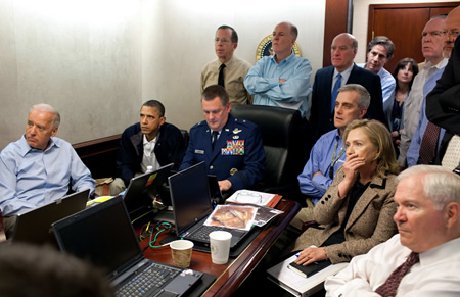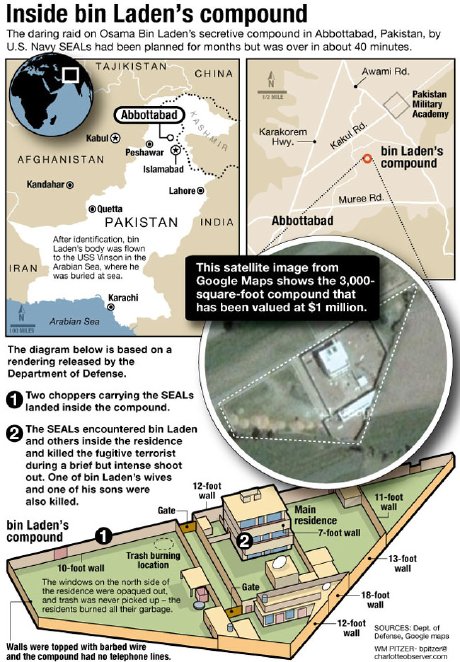Adil Najam
What do Pakistanis think about how Osama Bin Laden met his end, the implications of that end?
There are as many opinions on what happened in Abbottabad as there are Pakistanis. Maybe more. But there is no sense whatsoever where the government of Pakistan (or any of its major institutions) stand on what happened – or stood when it was happening. For 36 hours now the world has been waiting to see what Pakistan does and says – the silence and incoherence from Islamabad has not just been embarrassing, it has been damning. Finally, key institutions in Pakistan have begun trying to piece a narrative together – unfortunately it is way too late and the narrative itself rather lame.
When I put up a short post on Osama Bin Laden’s death soon after the news broke, I had hoped that in time more details would become available and we would get more clarity on what happened and how. We do now have more detail. But certainly not more clarity. The story about what happened in Abbottabad now lives in Spin-abad. Everyone – from governments, secret agencies, the media, the Twitterati, and your spinster aunt – are taking a spin. Many are taking multiple, sometimes contradictory, spins. Everyone except the Pakistan government.
That, of course, is a surprise – not only because the Pakistan government does have a lot of explaining to do, but even more because it is in the interest of the Pakistan government to do that explaining itself rather than have someone else do it for them. Yet, up until it was already too late, Pakistan seems to have abdicated that responsibility. In fact, President Barack Obama, Secretary Hillary Clinton and Senator John Kerry seemed to be making that (half-hearted) case for Pakistan more than anyone in authority in Pakistan. Given that President Obama had informed President Zardari before the speech from the US President, one would have assumed that the Pakistan President and his media handlers would have their own statement ready to go on the air minutes, if not seconds, after President Obama’s speech. This is not about spin and PR, this is Diplomacy 101: Own and define the narrative as soon and as clearly as you can before someone else defines it for you – especially if the narrative is likely to be unfavorable.
But the narrative, itself, is not the core of Pakistan’s challenges. The problem is the facts on the ground and the government’s inability and unwillingness to explain them. Pakistan is used to the feeling of the world ganging up on it. But there are good reasons for the questions being asked of Pakistan by the world today. There are even better reasons for the questions being asked of Pakistan by Pakistanis today. Whether the government comes clean to the world or not, it is vital that it respond to Pakistanis. The first is a matter of national image (no trivial issue, that), but the latter is a question of citizen trust in national institutions (an existential element of statehood).
The fact is that there is a Pakistan case to be made on this issue. And it needs to be made to Pakistanis much more than to the rest of the world. It is a case that forcefully stresses that a world, and a Pakistan, without Osama Bin Laden in it is a vastly better world than one with him in it – this is a villain who orchestrated events that have left more than 30,000 Pakistanis dead in extremism and terrorism. It is a case that legitimately highlights the sacrifices that Pakistan and Pakistanis have, in fact, made in the fight against terrorism. Most importantly, it is a case that honestly analyzes what happened in Abbottabad – it is not a surprise that Osama Bin Laden was found in Pakistan and in a large urban area (just like nearly every other major Al Qaida figure captured) – but an explanation is owed on why Pakistani intelligence failed to make the connections that led to him, an explanation is owed on exactly what Pakistan’s official role in the final operation was (or was not), and an explanation is owed on exactly what Pakistan’s strategy on countering terrorism is, who is running it, and why it is not working well enough or fast enough.
In a country and an ‘establishment’ as divided as Pakistan, this cannot be an easy conversation; it is not supposed to be. It is time to ask honest and tough questions of everyone. It has long need a necessary conversation; now is the time to have it.






















































It is a very good description of the whole event. It has helped me a lot in understanding the whole situation. Thanks for sharing it with the public.
http://www.dunyanews.tv/index.php?key=Q2F0SUQ9MiNO aWQ9MjUyNTE=
@Samdani: Yes, we all are looking for information consistent with own views. But my hunch is that it is too big a risk for the POTUS, particularly Obama, to concoct such a big lie and get away with it. It’s the age of wikileaks and truth is bound to come out sooner than later. If it turns out to be false, can you imagine what the Republicans, the Tea partiers, the Fox news, the Trumps, the Bachmans and the Palins will do to Obama?
Thanks to OBL episode, people like Hoodbhoy are having a field day. Just listen to him on TV channels and read his articles. Glad to know at least they are making some money off this propaganda. Can anyone tell me what is the policy of western public universities where they allow professors to make anti-patriotic statements and do it over years and decades without losing their job? Especially if they teach basic sciences and not politics?
It is only in Pakistan where Hood and others of his ilk have a field day and still retain their position in public universities.
I don’t care what people believe or not. This is the biggest embarrassment for Pakistan and its security establishment with long term repercussions and it is Pakistan’s prerogative to make sure that the events as described took place. Pakistan has the DNA evidence and they need to use it to make certain that it is OBL who died there.
@MQ
If you are right (and I think you are), then I guess those who believe that he is dead (simply on the evidence of the US President saying so) are also just believing what they want to believe (I certainly want to believe that he is dead, but it will be good to get some evidence, no?)